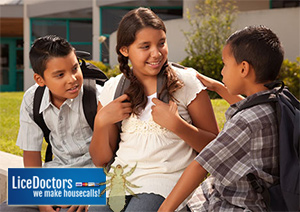SETTING POLICIES FOR SCHOOLS (for school personnel): According to Department of Health for Texas, "When developing district policy about head lice control here are some issues and topics you may want to consider there is no law that addresses head lice; the school or district can create there own guidelines by developing written policies that:
- Facilitate efficient and consistent implementation by all campuses
- Protect school nurses, teachers and other school staff
- Create peace of mind for administrators and parents
- Ensure all children are treated in a fair and equitable manner
- Policy should be a joint effort with your School Health Advisory Council, local health care providers, district administrators, school nurses, parents and other stakeholders."
More information: www.dshs.state.tx.us
El Paso Schools Head Lice Policy
Students with lice may return to school after treatment if only nits remain in the hair. The district does not have a "no nit" policy. "Head lice, although not an illness or a disease, is very common among children and is spread very easily through head-to-head contact during play, sports, or nap time and when children share things like brushes, combs, hats, and headphones. If careful observation indicates that a student has head lice, the school nurse will contact the student’s parent to determine whether the child will need to be picked up from school and to discuss a plan for treatment with an FDA-approved medicated shampoo or cream rinse that may be purchased from any drug or grocery store. After the student has undergone one treatment, the parent should check in with the school nurse to discuss the treatment used. The nurse can also offer additional recommendations, including subsequent treatments and how best to get rid of lice and prevent their return." More information: www.episd.org
Clint Public Schools
As with the above schools, Clint does not have a "no nit" policy, but students with live lice may not stay in school. "These small insects cause skin conditions that are uncomfortable and itchy, and could become infected. State laws require that students with live lice be excluded from school. Check with the school nurse to get information on treatment and when your child may return to school if those conditions are present." More information: www.clintweb.net
Las Cruces Public Schools

This district has a very lenient policy that reflects the recommendations of the American Association of Pediatrics. According to an article in the Las Cruces Sun-News, the district "has established a head lice policy aimed at helping students miss as little school as possible. Educators and school nurses used to send students home immediately if they had lice and to quarantine students until they no longer had nits, Ellen Williams, LCPS director of health services, said at the District Advisory Council meeting Monday evening. LCPS representatives lead the monthly meetings to improve communication between administration and parents. Under the new policy, students with lice are sent home at the end of the school day and can return to school after they finish treatment. Head lice do not jump or fly and in-school transmission is rare, Williams said. LCPS consulted with the nation's leading parasite expert, and its policy mirrors those of the Centers for Disease Control and other health institutions. At the council meeting, administrators also discussed changes to elementary report cards in light of the new common core."
More information: www.lcsun-news.com.






